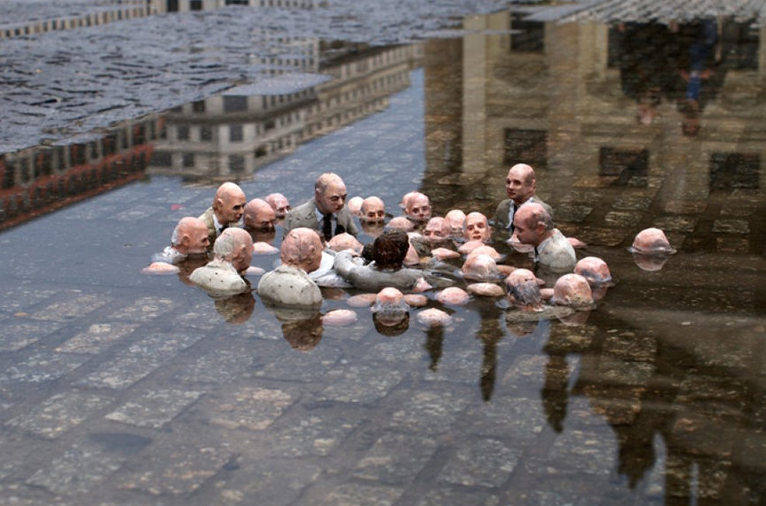This is the fourth in a series of essays from our Commissioning Editor, Dougald Hine. In Notes From Underground, Dougald invites us to go deeper into the context of the new climate movements and what they tell us about the moment in which we find ourselves. The essays are also available as a podcast and on YouTube.
It’s late in 1940, six months since the fall of France. Still a year to go before America joins the war. Meanwhile, Britain soldiers on alone – or so it likes to tell itself, the vastness of Empire folded conveniently into the background. Through the crackling of the wireless, the prime minister’s voice is unmistakable.
‘Every endeavour must be made to use the time available to produce the greatest volume of food of which this fertile island is capable. We shall all have to make changes to the way in which we eat and each household must now play its part in the way in which that food is grown. We have to look a long way ahead in this sphere of the war. We have to think of the years 1970 and 1971 and of the tonnage programmes which we shall be able to move and which we shall have to move across the oceans then.’
The mistake is glaring, absurd – yet this was the voice I heard in my head as I read the summary of the EAT–Lancet report on climate change and food, published in January, with its conclusions about the changes called for in our diets. In North America, an 84% cut in the average intake of red meat; for Europeans, a fifteen-fold increase in the amount of nuts and seeds we eat. All of this is to be achieved by 2050: a timeline based on reasonable assumptions and ambitious behaviour-change goals, for sure, but it doesn’t sound like a response to an existential threat.
The speech which Churchill actually gave that autumn, part of which was printed on the leaflets that launched the Dig For Victory campaign, urged Britain to ‘think of the years 1943 and 1944’.
* * *
The Oxford English Dictionary just declared ‘climate emergency’ its word of the year. The use of the term has grown a hundred-fold in the course of the past twelve months. This is one indicator of the scale of the shift in awareness which is the context of these essays.
‘The climate emergency movement’ is a banner suggested by Margaret Klein Salamon in a review of David Wallace-Wells’s The Uninhabitable Earth. Under this banner, she places everyone from Extinction Rebellion to Alexandria Ocasio-Cortez, Zero Hour, the Sunrise Movement and the school strikes. Salamon has a stake in how all this gets framed: she is the founder of the Climate Mobilization, a non-profit which worked with Bernie Sanders to get a climate emergency clause written into the Democratic Party platform during the 2016 presidential election. One of its board members worked on the campaign in Darebin, Australia, back in 2013, when it became the first local government in the world to declare a climate emergency. But it’s in the past year that this mode of organising has exploded, with 1,195 jurisdictions and local governments making binding declarations, representing more than half a billion citizens. That’s before you get to all the declarations by universities and colleges, or the artistic energy around groups like Culture Declares Emergency, or the non-binding declaration that was waved through unopposed by MPs in Westminster in the weeks after Extinction Rebellion’s April actions.
Salamon traces this explosion of activity back to Wallace-Wells’s original New York article. She quotes a passage from the book-length version, where he writes that the ‘practical technocrats of the environmental centre-left… believe that what is needed… is a global mobilization at the scale of World War II’. Yet her review is also an appeal to Wallace-Wells to get onboard with the movement he has helped to start. He is ‘ginger in providing support even to a political position he recognizes as correct’, Salamon suggests. When he admits that those practical technocrats ‘are right’, there is a ‘but’ coming: ‘it is also an undertaking of ambitions so inconsistent with the present tense of politics in nearly every corner of the world, that it is hard not to worry what will happen when that mobilization does not happen’. That fatalistic ‘when’ is what Salamon wants to pull him up on.
* * *
Given the amount of talk about ‘climate emergency’ this year, and given the amount of political organising and the number of declarations, I’m struck by how little mention there has been of what ‘emergency’ usually means in politics. Perhaps it’s because almost all of the movements Salamon mentions have come from English-speaking countries. In the UK or the US, you can invoke the spirit of World War II and it conjures a nostalgia for Victory Gardens, or the austerity kitsch of ‘Keep Calm and Carry On’, which threw its rose-tinted, vaguely Brexity veil over the decade since the financial crisis. Elsewhere in Europe the historical resonances are rather different, and this colours our understanding of what is at stake.
When a government makes a declaration of emergency, this generally implies the suspension of normal democratic processes, the rights of individuals, and even the rule of law. The concept of a ‘state of emergency’ is recognised in international law, which sets boundaries on which rights can be suspended and on what basis. This is an attempt to constrain the alarming implications of the state setting aside the usual limits of its power.
The person who did the most to make all this explicit was a German legal theorist, Carl Schmitt, who was also an enthusiastic Nazi. For Schmitt, the foundation of sovereignty is the ability to decide when the legal norms do not apply: the sovereign is the person or institution which gets to declare ‘the state of exception’. Having identified an external threat great enough to justify such a declaration, any individual or group which gets in the way of action against this external enemy is now an internal enemy, and it is in the public interest to take whatever action is necessary against them.
The logic of Schmitt’s theory was put into practice by his political friends. The framework of international law which we still have today was shaped by the exceptional horrors of the mass death machine they built and the resolve to prevent any repetition of these horrors. Yet those who framed the International Covenant for Civil and Political Rights had to acknowledge that there are situations in which a state is confronted with an extraordinary event – a natural disaster, civil unrest or armed conflict – which justifies actions that would otherwise be illegal. Their answer was to define an outer frame, a set of boundaries around what can and cannot be done in the name of a state of emergency.
One of those boundaries concerns the timeframe. A government declaring a state of emergency is required to inform the secretary-general of the United Nations of its expected end date. This condition alone might give us pause, when it comes to the current wave of declarations: once you declare a climate emergency, when is it going to end?
* * *
The deeper question here is about the choice of language: how to name an enormity. What words do we give to the realities of climate change? The naming of things is not trivial; it’s not an academic pursuit or a form of self-indulgence, fiddling with words while the world burns. It matters because words have consequences. With our choice of language we summon certain ghosts. We bring certain possibilities into view and cast others into shadow.
In the first of these essays, I suggested that those who are best placed to voice the experience of hanging over the abyss, the overwhelming encounter with the dark knowledge of climate change, are not necessarily equipped to act as guides or to hold the space within which we can come to terms with that knowledge. It’s a point which has been made sharper and more painful for many in and around Extinction Rebellion by the use of language by one of the movement’s founders.
Words have consequences. So what are the consequences of the language of emergency that has gathered such extraordinary momentum over the past twelve months? It’s a question I’ve been reflecting on with Duncan McLaren, formerly head of Friends of the Earth Scotland, now professor of practice at Lancaster University. We’ve written up our reflections in a forthcoming article. For the present, I want to bring up just one consequence of this language: the experience of time which talk of emergency tends to summon up.
At a meat industry conference in New Zealand in August, a worried trade representative reported that red meat sales in Europe had fallen by 20% in three months. If we start to see trends like that, then the new emergency consciousness picked up by the dictionary-makers might yet translate into societal changes with a tempo closer to that of Churchill than the sober proposals of the EAT–Lancet report. To bring the best out of such a shift, we should attend too to the shadow side of this emerging temporality.
There is a limit to how long any of us can cope with the emotional state induced by a sense of emergency. The pace of action it calls for, the heightened awareness and fight-or-flight stimulation: none of this can be sustained for long without leaving us strung out, stuck in loops of stress and anxiety. Compared to earlier waves of activism I’ve known, the new climate movements seem to have more room for emotional literacy, an awareness of embodiment and the vulnerabilities that go with it. But we come together against a wider societal context in which everything from economic policies and employment practices to the networked technologies woven through our lives conspires to leave us already strung out and stuck in loops of stress and anxiety – before we get to our ecological predicament.
If we are to avoid breaking ourselves on the vastness and urgency of what we are up against, then our sense of emergency needs to be subtle enough to hear the message of Max St John’s essay ‘Why We All Need to Stop Worrying About Climate Change’. Drawing on decades of experience with bodywork of different kinds, he argues for the importance of slipping the trap of anxiety, not only because of what it does to us but because of what it does to our effectiveness: ‘As a martial artist, ex-doorman and someone who’s been in a few violent confrontations I can tell you with certainty that if there is a fight, it’s not the angry, anxious person who wins.’
It’s not that the gathering sense of urgency is misplaced, exactly; it’s that we need to move through it into something stranger. Bayo Akomolafe likes to say, ‘The times are urgent: let’s slow down.’ The danger if we ignore such invitations is outlined by the Belgian philosopher Isabelle Stengers:
When I am speaking of slowing down, I am equating speed with mobilization. A mobilized army is an army that crosses the land with only one question – can we pass? – indifferent to the damage it causes. Whatever may inspire hesitations or attention must be banished within this framework of mobilization. What slows the army down is seen only as an obstacle. And, indeed, I see as a major challenge this sense of urgency that the fast transformation of the Earth may produce – we must stop quibbling, no time for that, we must act! This approach seems parallel to the demand to act in order to be competitive, to control market shares, or to rank our institutions. Since the nineteenth century, the sciences have been mobilized, have become ‘fast’ sciences, with researchers regarding whatever concerns … do not directly contribute to ‘the advancement of knowledge’ as a sinful waste of time. Now, within the knowledge economy, fast sciences are perceived as not fast enough; they are making patents and launching fabulous promises of technological revolutions that are attractive for investors but do not need reliable knowledge. The apotheosis of this paradigm is geo-engineering, the mobilization of technology against the Earth.
* * *
It’s too late, of course – too late to turn aside from the language of emergency. I’m not here to argue that we should, only to invite my friends who are using this language to think harder and speak more clearly about what it means; to recognise that there is fire in this language and to have a care for what might get burned down.
When you organise politically to demand a declaration of emergency, you cannot avoid the question of democracy. If such a declaration means anything, then it marks a fork in the road. It says that our existing political systems have failed, that they have been no match for the scale of the crisis, and this seems hard to refute. But having acknowledged their failure, two paths remain: more democracy, or less.
Since the tendency of emergency language is to point towards less democracy, if this is not what you wish for, then you need to be explicit: to make the case for ‘emergency democracy’, an extension of existing systems that allows for more meaningful forms of public involvement in decision-making. In this respect, Extinction Rebellion has been clearer than other manifestations of the climate emergency movement with its demand for a citizens’ assembly. The significance of this demand is not that the citizens’ assembly model offers the final word, when it comes to ‘more democracy’; it’s that it signals an intention to take that path.
Finally, if you are committed to that path, then keep your distance from those who are convinced that they have a plan for how to fix everything, if only the impediments of democracy could be swept aside. Keep your distance, not only out of a commitment to the virtue of democracy, but because the men with plans have mistaken the world for a problem to be solved, an exercise in engineering and a chance to demonstrate their cleverness. With their disregard for the complexity of the world, all they can offer is a repeat of the kind of mistake that brought us to the mess in which we find ourselves.





